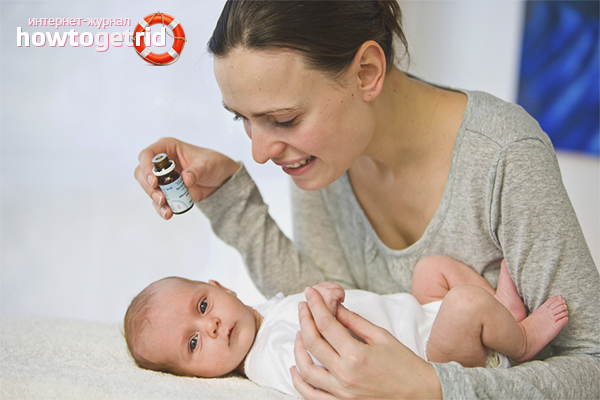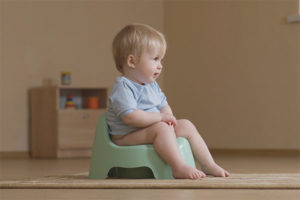The content of the article
Pediatricians prescribe vitamin D to almost all infants. Babies born prematurely receive cholecalciferol from 2 weeks. Infants born in a timely manner get acquainted with a useful supplement in 5-6 weeks. Vitamin D is needed for the children's body to form the skeleton and nervous system, strong immunity and the prevention of rickets. The supplement improves the well-being and health of the newborn, if the mother uses it correctly.
Dosage and schedule
For preventive purposes, the drug is prescribed for infants in the autumn-winter period. In the summer, the child constantly tans and bathes in the sun, which stimulates the production of natural calciferol. From October to March, the children's body suffers from a lack of ultraviolet radiation. Infants cannot receive vitamin D from adult food, because it only eats mother's milk. The level of calciferol decreases, the baby becomes restless and often catches a cold.
Infants who are immunocompromised but have no signs of rickets are advised to give 500 IU of vitamin D daily. So many supplements are contained in one drop of an aqueous solution.
It is necessary to increase the dosage if the mother noticed in the child:
- restlessness or lethargy;
- sweating of the hands, feet or head;
- timidity;
- redness or rash in the neck;
- itching of the head.
Signs indicate the development of rickets. A lack of vitamin D leads to depletion of the nervous system and bone deformation. The rib cage enters, the spine and legs bend, the shape of the head changes. Synthetic calciferol will preserve the baby's health. The dosage of the drug is determined by the pediatrician, who conducts a thorough diagnosis.
The child is examined, weighed, and his height is measured. Blood is taken from the baby and the level of calcium and phosphorus is determined. The dosage of the drug depends on the concentration of minerals in the body of the newborn. If the level of calcium is reduced, the daily portion of calciferol can be increased to 665 IU.
The baby begins to take vitamin D at the age of 2-5 weeks, and ends at 3 years. At this age, the likelihood of getting rickets is reduced, because the child’s body is able to independently produce a useful component.
The baby takes calciferol for a month, and then the mother takes a six- or seven-day break.
In summer, you can refuse synthetic vitamin D. The supplement is replaced by sunbathing, long walks in the park or relaxing in the country. The baby is sunbathing from May to September, and in October, the mother introduces calciferol into his diet. Premature babies who get sick even in summer are advised to take synthetic vitamin year-round with short breaks.
For forgetful parents, who often miss the supplement, they are advised to try the shock dose method. A baby at the age of 2–4 weeks is given 10 mg of an oil solution. It is impossible to inject intramuscularly, injections of the vitamin are absorbed too slowly. The drug is diluted with water and make the baby drink a healthy cocktail. The procedure is repeated after 2.6–3 months.
Which to choose
A solution of calciferol is of two types: aqueous and oily. Pediatricians are more likely to prescribe the first variety.
An aqueous solution of vitamin D has several advantages:
- absorbed 2-3 hours after administration;
- toxicity is lower than that of an oil-based solution;
- easier to calculate the dosage;
- rarely causes side effects.
An aqueous solution is prescribed for babies to prevent rickets. If a child has signs of this disease, oil-based vitamin D is preferred.In structure, it is closer to calciferol, which is produced by the body. The solution starts the production of natural vitamin D, so the condition of the child quickly stabilizes and improves.
Oil-based calciferol is contraindicated in babies diagnosed with:
- bowel or stomach diseases;
- benign formations in the internal organs;
- kidney problems
- ulcers on the walls of the stomach or intestines;
- violation of mineral metabolism.
A water-based drug for such diseases is prescribed by a pediatrician who carefully monitors the reaction of the child's body to the supplement. The dosage can be reduced to 250 IU or find an alternative way to increase the level of vitamin D in the blood of infants.
Premature infants and babies with symptoms of rickets are prescribed Wigantol. A drop of the drug contains 675 IU of vitamin. The medicine is taken from 2 weeks. It can be replaced with a remedy called Vitamin D3. A drop of the drug is equal to 625 IU of calciferol. The bottle with the product is sold without a dispenser, so mom has to use a pipette.
Aquadetrim is recommended for full-term infants. The child is given the drug from 4 weeks. In a drop of medicine, the daily norm of vitamin D3 is 500 IU.
Accepted for the prevention of rickets Finnish remedy Devisol. The oil-based preparation is well absorbed, does not cause allergies. Pediatricians prescribe a medicine to make the child’s body produce Vitamin D. They don’t take the supplement if the newborn has liver problems.
Full-term infants and babies born prematurely are prescribed Jekovit for the prevention of rickets. The water-based preparation contains vitamin D2. The medicine is well absorbed, but is contraindicated in children with renal failure and diseases of the genitourinary system.
Baby ration
Calciferol is found in “front” breast milk. But in women who adhere to a strict diet for lactating, the concentration of vitamin in the body is minimal. The child does not receive a daily dose of the component. Breast-fed infants are prescribed water-based vitamin D to better absorb calcium from their mother’s milk.
Kids who feed on artificial mixtures are more fortunate. The composition of modern baby food includes various minerals and vitamins, including calciferol. The child receives the substances necessary for the normal development of the nervous system and the absorption of calcium. Moms are advised to carefully study the boxes with the mixtures and to warn the pediatrician that the child is breast-fed. Such babies are prescribed vitamin D only for symptoms of rickets.
Synthetic calciferol is contraindicated in babies who eat breast milk substitutes. Otherwise, the child has signs of an overdose of vitamins. Digestive organs, nervous system, liver and kidneys suffer.
The baby will not have to take liquid calciferol if his mother consumes a lot of food rich in this vitamin. Useful products include:
- beef;
- fish fat;
- raw egg yolks;
- seafood;
- natural butter.
Mom can get a useful component from sea fish: mackerel, herring, tuna or mackerel. If a woman has a diverse diet, the baby should have a blood test. The laboratory determines the level of vitamin D, phosphorus and calcium. And if he is tall enough, the baby does not need to take drugs to prevent rickets. Means with calciferol will only harm him.
Benefits and rules of admission
Vitamin D is given to the newborn in the morning. A drop of the drug is diluted with a tablespoon of water. The solution is offered to the baby during or after feeding, in order to improve the absorption of mother's milk and the beneficial components that it contains.
Thanks to calciferol, healthy and strong teeth are formed in the baby, the work of the digestive organs is normalized. Newborns taking solutions with vitamin D become calmer. In children, appetite improves and immunity increases, so they are less likely to get sick and gain weight quickly.
Moms give babies preparations with calciferol for the prevention of serious diseases:
- diabetes mellitus;
- rheumatism;
- sarcoidosis;
- heart defects;
- thyroid problems.
Water and oil solutions with vitamin D are recommended for children prone to colds, infectious diseases and inflammations. Instead of special drugs, you can give your child complex products containing not only calciferol, but also other minerals. These include:
- Vidailin-M, which is available in the form of a syrup;
- Water the Baby, a solution for internal use;
- Multi-Tabs Baby, transparent drops with a dispenser.
Any drug is bought for a child after consultation with a pediatrician. Some supplements are not compatible with antibiotics, heart medications, and diuretics.
Accept or not accept
Soviet-trained pediatricians out of habit prescribed drugs with calciferol to all newborns. Units give direction to a biochemical blood test. But the supplement is not as harmless as it seems. Babies with an overdose of vitamin D have unpleasant symptoms:
- thirst and dry tongue;
- trouble sleeping
- constipation, which alternate with diarrhea;
- stomach ache;
- nausea, which reduces appetite;
- vomiting
- headaches;
- mood swings;
- dyspepsia;
- muscle and joint pain;
- weight loss.
It is necessary to cancel the drug if after taking the child becomes restless, refuses to breast or a bottle, cries loudly, the baby cannot go to the toilet. It is worth contacting a pediatrician with a weak and slow pulse, rapid weight loss and dry skin that has lost elasticity. Taking drugs with calciferol after the appearance of the listed symptoms is stopped. The additive leads to the accumulation of calcium salts in the body. Excess minerals cause problems with the liver, heart, stomach, blood vessels, and intestines.
Mom can refuse vitamin D if she believes that the child is developing well without the supplement. Taking calciferol is not necessary for infants who:
- live in the eastern or southern part of the country;
- daily walk on the street for 2-3 hours;
- take sunbaths even in winter.
Supplements are not needed for babies with fair skin. Moms of swarthy infants are recommended to walk and sunbathe more often. When taking ultraviolet baths, do not use sunscreen.
Contraindications
Vitamins D2 and D3 are not prescribed for babies who have been diagnosed with:
- active tuberculosis;
- malignant or benign tumors;
- hypersensitivity to vitamin D;
- urolithiasis;
- diseases of the cardiovascular system;
- digestive tract problems;
- hypervitaminosis D3;
- high calcium in the body.
Early or rapid closure of the fontanel is not a contraindication. Vitamin D does not affect this natural process.
The baby receives calciferol with mother's milk or a mixture. But sometimes the newborn does not have enough vitamin D, and the baby becomes lethargic, moody and irritable. If the mother noticed that the baby's hair is falling out, palms and head sweating heavily, you need to consult a pediatrician and start taking medications to prevent rickets.
Video: All About Vitamin D











Submit